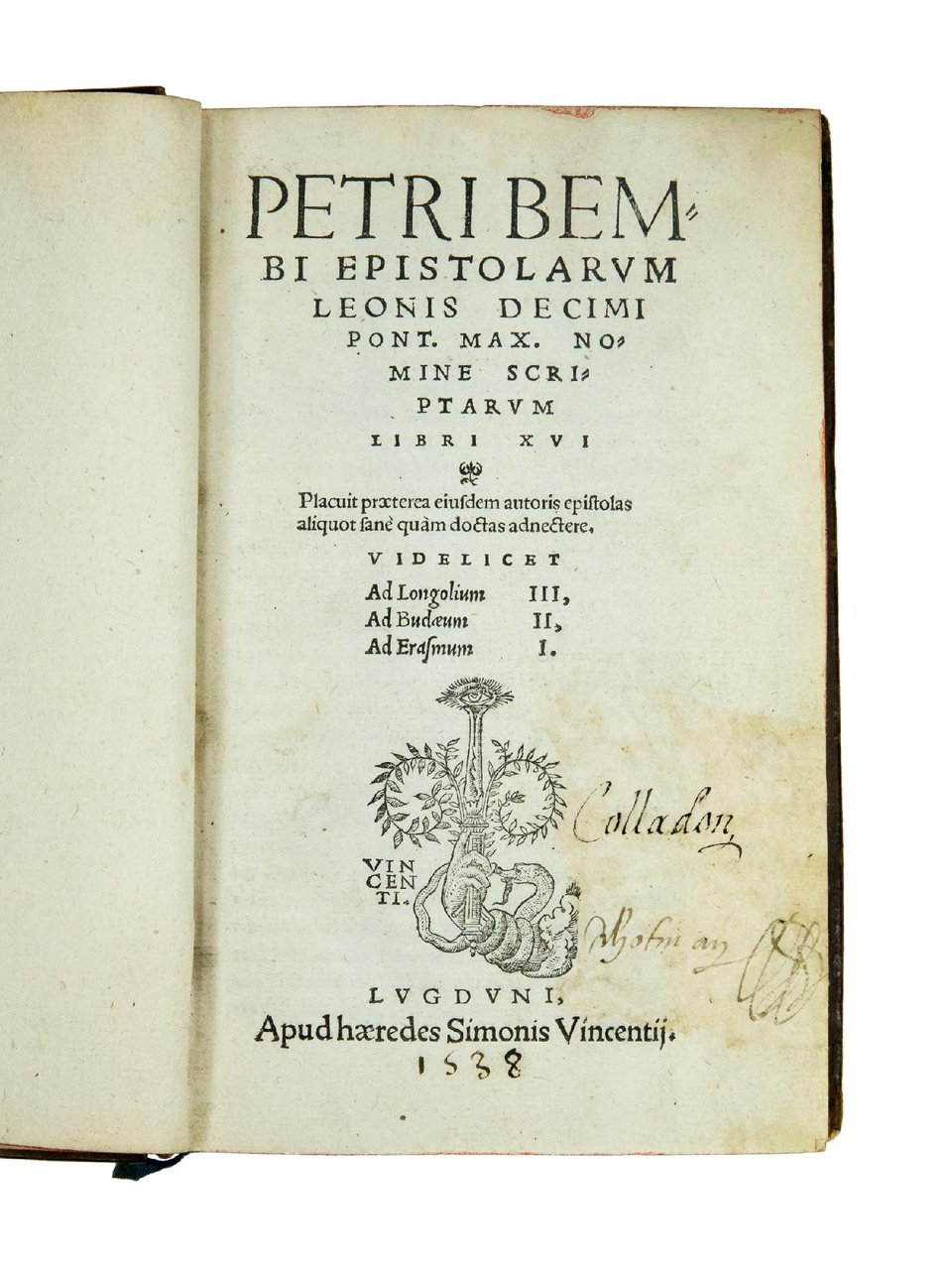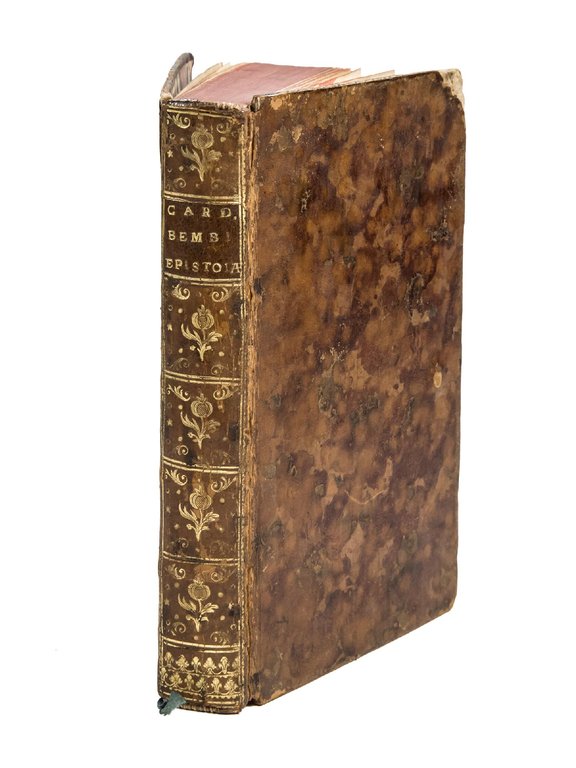Epistolarum Leonis Decimi Pont. Max. Nomine scriptarum libri XVI. Placuit praeterea eiusdem autoris epistolas aliquot sanè quàm doctas adnectere. Videlicet Ad Longolium III, Ad Budaeum II, Ad Erasmum I
Epistolarum Leonis Decimi Pont. Max. Nomine scriptarum libri XVI. Placuit praeterea eiusdem autoris epistolas aliquot sanè quàm doctas adnectere. Videlicet Ad Longolium III, Ad Budaeum II, Ad Erasmum I
Metodi di Pagamento
- PayPal
- Carta di Credito
- Bonifico Bancario
- Pubblica amministrazione
- Carta del Docente
Dettagli
- Anno di pubblicazione
- 1538
- Luogo di stampa
- Lyon
- Autore
- BEMBO, Pietro (1470-1547)
- Editori
- Dionis de Harsy for the Heirs of Simon Vincent
- Soggetto
- Ars Epistolica
- Stato di conservazione
- Buono
- Lingue
- Italiano
- Legatura
- Rilegato
- Condizioni
- Usato
Descrizione
8vo. 432 pp. a-z8, A-D8. With the printer's device on the title-page. 18th century marbled calf, gilt back with brown morocco label, red edges, marbled endpapers, with an old entry of ownership ‘Colladon' (maybe Nicolas Colladon, ca. 1530-1587, pastor at Geneva and, together with Théodore de Bèze, Calvin's first biographer).
Baudrier, Suppl. I, p. 16, no. 49; Index Aureliensis, 116.388; P. Bembo, Lettere. Edizione critica, E. Travi, ed., (Bologna, 1987), I, p. XLIV; G. Gueudet, L'art de la lettre humaniste, (Paris, 2004), p. 599, no. 2.
SECOND AUGMENTED EDITION, which contains at the end a small collection of letters (Auctoris eiusdem aliquot cum doctae, tum ad doctissimos huius seculi viros scriptae) addressed by Bembo to some of his fellow humanists (cf. B. Marx, Zur Typologie lateinischer Briefsammlungen in Venedig vom 15. zum 16. Jahruhundert, in: “Der Brief im Zeitalter der Renaissance“, ed. F.J. Worstbrock, Weinheim, 1983, p. 151). The body of the volume is a reprint of the edition printed at Venice by Giovanni Padovano and Venturino Ruffinelli in 1536.
Longueil, Christophe de. Roma, May 29, n.y. (p. 411)
id. Roma, August 20, n.y. (p. 413)
id. Roma (p. 417)
Budé, Guillaume. Venezia, January 4, n.y. (p. 420)
id. Roma, April 6 (p. 422)
Erasmus, Desiderius. Padova, April 4, 1529 (p. 424)
Pietro Bembo, born in Venice to a patrician family, received a humanistic education in Florence, Rome, Bergamo and Messina (1492-1494), where he studied under the Greek scholar Constantine Lascaris. In 1496 he published his first work, the Latin dialogue De Aetna. Unsuitable for the political career to which he was destined, he decided to devote himself to literary pursuits. Between 1495 and 1500, while studying philosophy at the University of Padua and attending the courses of Niccolò Leoniceno in Ferrara, he wrote a dialogue on love, Gli Asolani (1505), inspired by his relationship with Maria Savorgnan. In the following years he began composing his major work, Le prose della volgar lingua, which underwent many changes and corrections before it was published for the first time in 1525. Thanks to its huge success (from the expiry of the privilege until the end of the century it appeared in over twenty editions), Le Prose became the model writing manual in the vernacular and imposed the Italian vernacular literature to the attention of the humanists. In 1501 and 1502 he also prepared milestone editions of Petrarch and Dante for Aldo Manuzio's printing house, giving birth to vernacular philology.
Before leaving Ferrara for Venice in 1504, Bembo had a love affair with Alfonso I d'Este's wife, Lucrezia Borgia, to whom he dedicated the first edition of Gli Asolani. In 1506 he moved to Urbino, where he pursued his literary interests and met the playwright and cardinal Bernardo Dovizi da Bibbiena, who soon became his closest friend. In 1513 he wrote De imitatione, a treatise on Ciceronian Latin, and, together with his friend Jacopo Sadoleto, he was appointed by Pope Leo X as secretary of papal briefs in Latin. In 1519, disappointed in his expectations of an ecclesiastical career, he left Rome and retired to his villa in Padua.
From 1519 to 1539 Bembo lived mostly in Padua and Venice, attending to the publications of Le Prose and of his Rime (1530), intended to provide an authoritative example of the principles he had previously theorized. In 1529 he was appointed historian of the Republic of Venice (his Historia Veneta was published posthumously both in Latin and Italian in 1551-1552), and librarian of the Biblioteca Nicena (today Marciana).
In 1539 Pope Paul III ordained him a priest and named him cardinal. He spent the last years of his life either in Rome or in his bishoprics, Gubbio (1541) and Bergamo (1544) (cf. C. Kidwell, Pietro Bembo: lover, linguist, cardinal, Montreal, 2004, passim).


